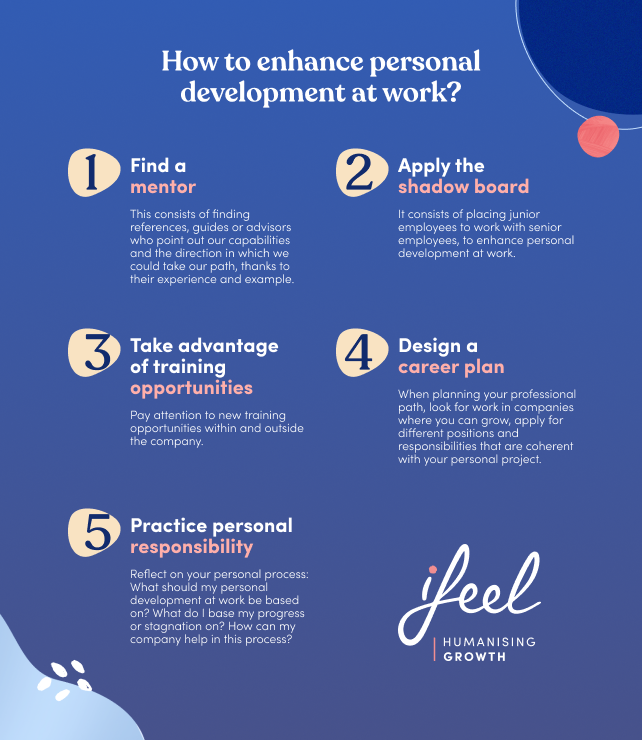As it happens outside the workplace or outside its influence, personal development at work must be understood for what it is. It is a somewhat blurred concept, halfway between gaining personal maturity, psychological well-being, and even happiness. It is a continuous process of discovery, elaboration, improvement, skills and knowledge acquisition, and identity building.
In this case, besides, we mention it in its relation to the professional sphere, to the extent that work can be a means through which the person seeks and achieves a high degree of personal development.

What is personal development at work?
As mentioned above, we can consider that personal development at work is nothing more than a path, a trajectory along which we navigate. It is a journey undertaken and traveled without always involving a high degree of awareness, will, or deliberation, but it happens. Indeed, whether it is more or less significant, personal development at work is a journey that happens, something that happens to us as employees and, therefore, as people. A movement that involves changing through our profession.
What is personal development at work?
Personal development at work aims to enhance skills, adopting a growth mindset and identify strengths and weaknesses.
How is personal development at work linked to professional development?
The skills we learn (or enhance) can be used to grow professionally, and therefore open new opportunities in our career path (whether in our current job or other fields).
For example, this can be done by upskilling and reskilling. Reskilling is an upgrade based on what’s already there. Reskilling is what is commonly known as professional recycling. Upskilling refers to “additional training,” meaning the process through which an employee acquires new skills and knowledge or the process of teaching employees new skills. It is, therefore, based on the development of new competencies.
Should companies invest in training to foster personal development at work?
Yes. There is no doubt that companies should invest economically in their staff. Not only will this strengthen their abilities or give rise to new ones, but it also means that employees will be committed and motivated to stay in the company, leading to a lower turnover rate and higher employee retention.

Like any path, to the extent that personal development at work is possible, it has several elements worth differentiating. Specifically, it has a starting point (lost somewhere in our beginnings as employees), a direction, a more or less clear goal, and milestones that give it structure and mark the path.
Besides being relevant moments in the development path, these milestones can also be indicators that help the walker not get lost and know where they are. This gives them security and allows them to continue walking the path they have to walk now more efficiently than if they were going blindly. We must also consider that the road has several stages, and its pavement may be uneven or difficult. The road is not always marked. It is not always clear, easy, or pleasant.
How to foster personal development at work
Although we differentiate them with language to better analyze them, there is no real difference between what we would consider professional development and personal development in general. Professionalism is also personal, just as what happens to us, what we do, and who we are outside of work influences us when we step into our role as employees.
In his book In Praise of Paths, Norwegian writer Torbjorn Ekelund wrote, “a straight line isn’t always the shortest distance between two points”. This means that sometimes the path of personal development at work is neither what it seems or looks like at first nor what each employee would like it to be.
It is enough to observe the roads or paths one ascends or descends on a mountain: they are never straight but winding. They take detours because they do not follow intuitively the most predictable way to get from point A to point B, but the one that, as Ekelund writes, “offers the least resistance”.
Whatever the case may be, here are 5 basic aspects necessary to enhance personal development at work.
1. Mentoring
To develop personally and professionally, it is essential to have inspirational references and protective guides who point out our current and potential capabilities at all times and where our path could lead us. These references are our mentors, who, at critical moments, sponsor our professional career thanks to their experience and example.
2. Shadow Board
A shadow board is a work philosophy characterized by the intergenerational and interdisciplinary composition of teams to make the most of the talent in people from very different corporate profiles or, above all, from very different positions within the company.
Shadow boarding consists of putting junior employees together with senior workers on their strategic projects. This methodology can be an excellent tool to enhance personal development at work.
3. Training
Although it takes time, energy, and money, we all know that knowledge does not take up space. One of the best ways to move forward is by acquiring new skills, recycling the competencies we already have, and, in general, acquiring new knowledge.
Therefore, when considering how to improve our personal development at work, we must pay attention to the training opportunities that are available both inside and outside the company. We should also view companies with good employee training strategies positively.
4. Professional development
To develop is to progress, grow, and broaden our horizons, including our professional ones. For this reason, when it comes to enhancing our personal development at work, the possibility of working in a company that is large enough to give us room to extend and broaden our career path, with the possibility of offering us roles, tasks, functions, and responsibilities to which it is feasible to aspire and which are consistent with our project, is especially relevant.
3. Personal responsibility
Regardless of what circumstances can do for us, for example, through the company we work for, all employees must take responsibility for their personal development at work. That personal responsibility is, of course, based on trying to answer questions such as the following:
- Where does each employee consider their personal development at work to belong?
- On what do they base their progress, improvement, or advancement?
- By what criteria do they locate setbacks or stagnation in their growth process concerning work?
- What role does the company play in facilitating its employees’ personal development at work?
- What kind of employee, i.e., person, do they want to be?

Improving emotional well-being in companies
At ifeel, we want to increase employees’ and their companies’ well-being at work by helping them to create stimulating and healthy work environments.
Our psychologists have created an emotional well-being program for companies to achieve this. Through this collaboration, your company’s human resources managers will be able to receive personalized, data-driven advice on how to improve their teams’ psychological well-being. Moreover, this program provides employees with complete mental health care services structured at different levels according to their needs. Try our program now to see how it can help you.
Visit our Resources section, where you will find Podcasts on different topics (such as the employee experience or how to set your career goals), HR Guides, or Interviews with leading HR managers. In addition, you will be able to access a Psychosocial Risk Factors Template, which will help you comply with the Labor Inspection requirements.
We hope this post on personal development work has given you good ideas to facilitate fulfilling your tasks. Contact us to learn more about how our emotional well-being program for companies works. Simply get in touch, and we’ll get back to you as soon as possible.










